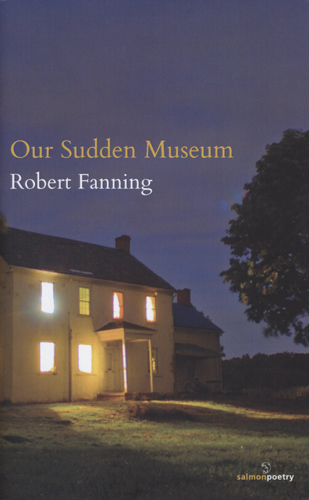Our Sudden Museum
The word “museum” is usually associated with velvet ropes, alarms, roving guards. As Fanning introduces the word sudden into these carefully executed spaces filled with unfamiliar objects, he invites motion into a static world, redrawing the boundaries of artifact and observation. Though Our Sudden Museum is dedicated to the memory of his father, sister, and brother, and is filled with funny and painfully wrought elegies, unforeseen death reverberates his attention into new, unexpected places. Ultimately, with a broad range of forms and tones, Fanning ushers us into an elevated, enlightened space only reached through profound grief. Fanning’s delivery is charged with urgency and grace, since at any moment, the mundane or cherished could be taken away, suspended under glass.
While objects in museums travel and assume hefty historical weight through their membership in a rigid collection, Fanning tackles the transfiguration of emotion, the kinetics of memory. The book begins with “House of Childhood,” where, in a fluttering metamorphosis, the speaker is alternately a house, a bird, and the very seams holding artifact together:
Every dream I’m in its bones. Its bones
though hollow of me now. Its walls. What holds
the hallowed dust. The joists. The moans.
Oh Ghost, Oh Lady of Sorrows, I’m old.
I’m grown and gone. I’m a bird that can’t thrash free.
“The Bird in the Room” captures a similar dynamism that is quite original in a volume exploring grief. When faced with the challenge of listening to an aging parent, how many of us would invite such action, such ambiguity, into the scene?
As she speaks I try to hear her
through another feather
falls
from her mouth
The shadow of a wavering tree
covers the wall
Does she know
it’s in the room with us
In a volume chock full of confrontations with death, this speaker copes how most of us would:
What are you doing she asks
as I open
her door trying to let
the thought of her
death escape me
And yet throughout the book, we are offered the full gamut of methods of weathering death, and Fanning isn’t afraid of delving into sometimes vulgar or vividly morbid detail.
“I’d kick your coffin over / and piss the makeup off / your face, my sister says,” begins “Love Poem,” which catalogs the ultimately ineffective threats siblings hurled to keep a suicidal brother alive:
One week ago tonight, we stood over Tom
in his box, staring at his bad
cosmetic job, rouge on the flat
cheekbones, the lips sealed
a sick pink.
And yet the magic of Fanning’s work lies in the universal. Even if the reader hasn’t experienced the death of a sibling, who hasn’t joyfully perused items that don’t belong to us? “Sister, now I can tell you this: / how I’d steal // into your room / days you were gone,” begins the relatable “Flute.” The poem contains a breathtaking turn common in Fanning’s work:
I’d stare at the disassembled parts:
each silver tube snug in red
velvet, click of fingered keys
rubbed bronze.
I lacked the adequate prayer
my lips might blow across you,
kneeling over your open casket.
While the book is not broken into sections, the sequencing of poems slowly progresses toward the birth and rearing of children by the end, which provides a perfect counterpoint to such profound loss. In “Paper Dolls,” Fanning masterfully renders the joy and fear involved in an impending birth:
Since our news, the hours
wobble like bubbles from a playground
wand, every minute drifting, oblong
and sure to burst.
And what do children do but rewrite any conception of time we might have had before them? In “Saving the Day,” Fanning’s poetic imagination turns our orderly, painful adult world on its head when he shares discoveries “Upon finding my lost day planner on the floor of my daughter Magdalena June, age 2“:
Pages of my hours’
rigid grids splashed with your unruly hues,
my walls of stacked blank days splattered
by spilled giggles and curlicues. Sweet girl,
my year’s unwound by your fluttering hands.
With my future made so bright by you,
may I ever be ready for never.





